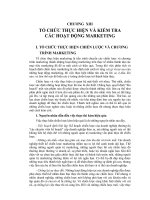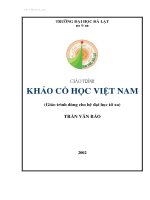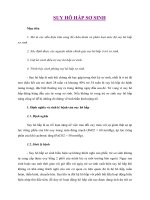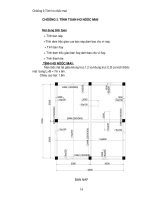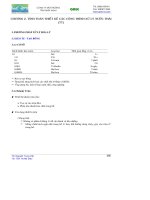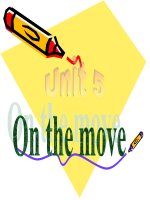Giáo trình New Head Way - Telling Tales pdf
Bạn đang xem bản rút gọn của tài liệu. Xem và tải ngay bản đầy đủ của tài liệu tại đây (2.73 MB, 41 trang )
Prepared questions
1. What are the forms and uses of Past Simple Tense?
2. What are the forms and uses of Past Continuous Tense?
3. What are the forms and uses of Past Perfect Tense?
4. Past tenses in the passive?
a
b
c
1. When Carol arrived home, Marked
cooked dinner.
2. When Carol arrived home, Marked
was cooking dinner.
3. When Carol arrived home, Marked had
cooked dinner.
Positive
Negative
Question
Short answer
Regular verbs: Verb + -ed
Walked
Finished
Watched
Booked
Wanted
Pointed
Needed
Arrived
Enjoyed
Listened
/ t /
/ id /
/ d /
Irregular verbs p157
We met in 2000.
She taught English yesterday.
John left two minutes ago.
The Past Simple is used to express
1. a finished action in the past
I went to Manchester last week
2. Action that follow each other in a story
Mary walked into the room and stopped. She listened carefully
3. a past situation or habit
When I was a child, we lived in a small house near the sea.
Past Simple & Time expressions
I met her
last night
two days ago
yesterday morning
in 2001
in summer
when I was young
Underline the correct verb form
•
While he rode/ was riding in the forest, he lost/ was losing
his wig.
•
When I arrived/ was arriving the party was in full swing. Paul
danced/ was dancing with Mary, and Pat and Peter drank/
were drinking champagne.
•
When I finished/ was finishing the ironing, I cooked/ was
cooking dinner.
•
How fast did they travel/ were they travelling when their car
had/ was having a puncture?
•
A police car passed/ was passing us on the motorway when
we did/ were doing 80 miles per hour.
•
I took/ was taking a photo of him while he ate/ was eating an
ice-cream.
•
He didn’t like/ wasn’t liking the photo when he saw/ was
seeing it.
•
I’m sorry I woke/ was waking you. What were you dreaming/
did you dream about?
Listening: A bald knight
Listening: A bald knight
bald
Knight
Listening: A bald knight
Listening: A bald knight
1. Put the verb in the brackets into the Past Simple. They are all irregular
grew lost became bought put thought
set caught fell felt saw wore
2. Complete the moral of “The bald knight”
When people laugh at us, it is best to ……………………
laugh with them
3. The following sentences have been taken from the story. Read it again
and decide where they fit. Listen and check your answers!
a. …………………………………….As he was dressing in front of his mirror.
b. He was riding along, singing merrily to himself, when he passed under an oak
tree and ……………………………………………
c. …………….They were all still laughing when they arrived back at the castle.
“How handsome I look”!
his wig caught on a branch
and he started laughing, too.
They met and fell in love
They got married
They had their first son
They lived in Hong Kong
They had five more sons
They sent their sons to
boarding school
They lived in six different
countries
They were happily married
My grandfather died
when
while
during
for
They returned to Britain.
They were living in Hong
Kong
The Second World War
They were working
abroad
The summer of 1991
Five years
Their marriage
Over forty-five years
They were working
together in Malaysia.
LISTENING (Page 26 – 27)
a. as soon as their father had died.
1. Where do the following sentences fit the story?
1. Where do the following sentences fit the story?
2
2
b. who had worked hard in his vineyard all his life
1
1
c. what the father had meant by the great treasure,
6
6
d. and all the time as they were working they
wondered what their father had left for them.
3
3
e. They felt that all their hard work had been for
nothing.
f. Soon they had dug up every inch of the vineyard.
5
5
4
4
2. Complete the moral at the end
2. Complete the moral at the end
The moral of this story is:
Hard work brings ……………………………
its own reward
its own reward
Join the sentences using the conjunction in brackets
Join the sentences using the conjunction in brackets
•
I took an aspirin. My headache disappeared. (when)
•
He drove 200 miles. He stopped for a break. (after)
•
I couldn’t pay for the ticket. A thief stole my wallet
(because)
•
She passed her driving test. She bought a car. (as
soon as)
•
I didn’t go to Italy. I learnt Italian (until)
•
He didn’t tell the policeman. He took the money.
(that)
•
We didn’t tell Anna. George rang. (that)
•
My headache disappeared when I had taken the aspirin.
•
He stopped for a break after he had driven 200 miles.
•
I couldn’t pay for my ticket because a thief had stolen my
wallet.
•
As soon as she had passed her driving test, she bought
a car.
•
I didn’t go to Italy until I had learnt Italian.
•
He didn’t tell the police that he had taken the money.
•
We didn’t tell Anna that George had rung.

